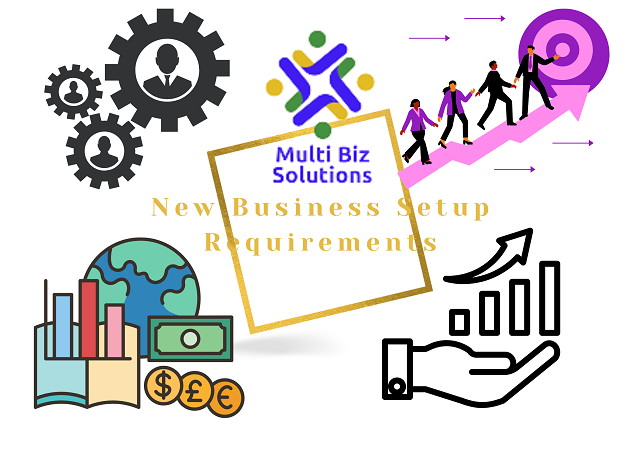Setting up a new business involves several fundamental steps and requirements to ensure legal compliance, operational readiness and long-term success. Here are the new business setup requirements:
Business Idea and Plan:
Begin with a clear and viable business idea. Define your products or services, target market, unique selling proposition (USP) and business goals. Develop a comprehensive business plan outlining your business concept, strategy, financial projections and marketing plan.
Market Research:
Conduct market research to assess the demand for your products or services and understand your competitors, target audience and industry trends.
Legal Structure:
Choose a legal structure for your business, such as a sole proprietorship, partnership, limited liability company (LLC), corporation, or others. This decision impacts liability, taxation and ownership structure.
Business Name and Registration:
Select a unique and suitable business name that complies with local regulations. Register your business name with the appropriate government authorities and obtain any necessary permits or licenses.
Business Plan and Financials:
Create a detailed business plan that includes financial projections, startup costs, funding sources and a budget for the first few years. Secure startup capital through personal savings, loans, investors or grants.
Tax Identification Number (TIN):
Obtain a tax identification number (TIN) or employer identification number (EIN) from the tax authorities. This is essential for tax reporting and compliance.
Legal Compliance:
Register your business with the relevant government agencies, such as the local business registrar, state department or corporate affairs commission. Comply with all applicable federal, state, and local regulations, including zoning, health permits and environmental permits.
Business Location:
Choose a suitable location for your business, whether it’s a physical storefront, office space or a virtual office. Negotiate leases or contracts for your business premises.
Business Bank Account:
Open a separate business bank account to manage business finances separately from personal finances. Establish a system for accounting and financial record-keeping.
Business Insurance:
Consider insurance options, such as liability insurance, property insurance or workers’ compensation, to protect your business and assets.
Business Website and Online Presence:
Create a professional website and establish an online presence, including social media profiles, to promote your business and reach a wider audience.
Marketing and Branding:
Develop a marketing plan that includes branding, advertising, and customer acquisition strategies. Register domain names, trademarks, or copyrights as necessary to protect your intellectual property.
Supplier and Vendor Relationships:
Establish relationships with suppliers, vendors and service providers to secure the necessary resources and materials for your business operations.
Employees and Hiring:
If applicable, plan your staffing needs, recruit employees and comply with employment laws regarding hiring, wages and benefits.
Technology and Equipment:
Acquire the necessary technology, equipment and tools to run your business efficiently.
Business Systems and Processes:
Develop and implement operational systems and processes to streamline daily tasks, improve productivity and ensure consistency in operations.
Business Plan Review:
Continuously review and update your business plan and strategies to adapt to changing market conditions and business goals.
Permits and Licenses:
Obtain any required business permits, licenses and certifications specific to your industry or location.
Networking and Support:
Build a network of mentors, advisors and industry peers who can provide guidance and support as you grow your business.
Marketing and Launch:
Develop a marketing and launch strategy to introduce your business to the market and attract customers.
Remember that the specific requirements and steps may vary depending on your location, industry and business type. Consulting with legal and financial professionals, as well as seeking guidance from local business development agencies, can be valuable during the setup process.


Add a Comment